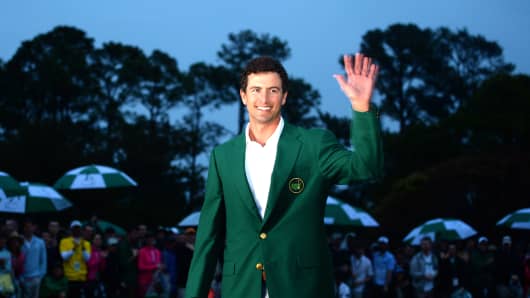Australia's long wait for a Masters champion is finally over, and when Adam Scott won at rainy Augusta National on Sunday an entire nation rejoiced and breathed a collective sigh of relief.
For Scott, it was the ultimate redemption for a player who was first labelled an underachiever when he did not contend in any of golf's four majors and eventually a choker when he did but could not win.
But for Australia, it was a chance to celebrate some good news on the sporting scene after a miserable performance at last year's London Olympics and a run of losses against England in the Ashes cricket series.
(Read More: FBI Found KPMG Auditor via Golf Buddy, His Lawyer Says)
Australia Prime Minister Julia Gillard led a flood of tributes to Scott.
"Adam Scott held his nerve and prevailed in the most intense pressure imaginable on any sporting field. With this outstanding achievement, Adam Scott has done his country proud," Gillard said in a statement.
For a country used to sporting success, the Masters had somehow managed to elude the country's best golfers for generations and winning it had become something of an obsession.
When Cadel Evans won the Tour de France in 2011, the Masters was deemed the last frontier and the 'Holy Grail' of Australian sport.
During Sunday's final round the streets in Scott's home town in Australia were deserted as everyone tuned it to watch the television.
"It was a Cadel Evans-like win," said Tony Roosenburg, the director of the Australian Open golf tournament.
(Read More: Australia Jobless Rate Rises to 3 Year High in March)
"There have been a lot of black moments for Australians at the Masters. It is great for Australian golf."
'Destiny'
Australians have won all of golf's other majors but the Masters had become a source of frustration after decades of agonising near-misses which started with Jim Ferrier, the 1947 PGA Championship winner, who blew a three-shot lead with six holes to play at Augusta National in 1950.
Peter Thomson won the British Open five times in the 1950s and 1960s but his best result at the Masters was fifth place in 1957. Bruce Crampton finished runner-up in 1972, as did Jack Newtown in 1980.
Then came Greg Norman, whose cruel close calls at Augusta became torturous viewing for Australians.
(Read More: Australia Consumer Confidence Falls in April)
Norman finished runner-up in 1986, bogeying the last hole to miss out on a playoff with a 46-year-old Jack Nicklaus. A year later, he was beaten in a playoff after Larry Mize holed out from off the green, but his darkest moment was yet to come.
In 1996, Norman led by six shots heading into the final round but crumbled to shoot a 78 and finish second again. Those near misses only spurred Australia's new generation of golfers to get their hands on the green jacket.
Scott, who was inspired by Norman and later became close friends with "The Shark," was deemed the leader of the new generation but struggled to make an impression at the majors.
His career seemed to be in freefall until two years ago when he almost won the Masters. But like his idol, he had to settle for second, tied with compatriot Jason Day in 2011.
"We are a proud sporting country, and like to think we are the best at everything, like any proud sporting country," he told reporters on Sunday.
"Golf is a big sport at home. It may not be the biggest sport, but it's been a sport that's been followed with a long list of great players, and this was one thing in golf that we had not been able to achieve.
"It's amazing that it's my destiny to be the first Aussie to win, it's just incredible."


